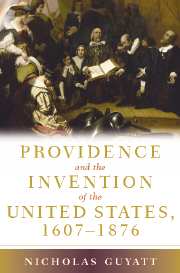Book contents
- Frontmatter
- Contents
- Acknowledgments
- Introduction
- PART ONE BRITAIN, AMERICA, AND THE EMERGENCE OF PROVIDENTIAL SEPARATISM
- PART TWO PROVIDENCE, RACE, AND THE LIMITS OF REVOLUTION
- 4 “Our Glorious Example”: The Limits of Revolutionary Providentialism
- 5 “Deifying Prejudice”: Race and Removal in the Early Republic
- 6 “Divided Destinies”: The Providential Meanings of American Slavery
- 7 “The Regenerated Nation”: The Civil War and the Price of Reunion
- 8 William Lloyd Garrison's Complaint
- Index
4 - “Our Glorious Example”: The Limits of Revolutionary Providentialism
Published online by Cambridge University Press: 12 December 2009
- Frontmatter
- Contents
- Acknowledgments
- Introduction
- PART ONE BRITAIN, AMERICA, AND THE EMERGENCE OF PROVIDENTIAL SEPARATISM
- PART TWO PROVIDENCE, RACE, AND THE LIMITS OF REVOLUTION
- 4 “Our Glorious Example”: The Limits of Revolutionary Providentialism
- 5 “Deifying Prejudice”: Race and Removal in the Early Republic
- 6 “Divided Destinies”: The Providential Meanings of American Slavery
- 7 “The Regenerated Nation”: The Civil War and the Price of Reunion
- 8 William Lloyd Garrison's Complaint
- Index
Summary
When Richard Price first argued that America would eclipse Britain and that the American Revolution would “begin a new æra in the annals of mankind,” many of his compatriots responded to the prediction with incredulity. In 1776 Lord North's government, eager to tamp down such unhelpful commentary on the American war, commissioned the historian Adam Ferguson to refute Price's views. Ferguson was a sound choice for the task. His 1767 Essay on the History of Civil Society had firmly established human agency rather than providential design as the engine of history, and Ferguson was dismissive of Price's claims that America would redeem the world. He acknowledged that the rebellious colonists had “extravagant plans” for a “Continental Republic” but predicted a collapse into a military dictatorship rather than Price's “new æra” for humanity. The idea that Britain was “to be sacrificed to America” made no sense to a nonprovidential historian: why would anyone abandon the British nation, “which has attained high measures of national felicity, for one that is yet only in expectation?” While Price envisaged American expansion and continental ambition as a natural consequence of historical providentialism, Ferguson had no faith in America's future progress and saw no reason to forsake Britain.
After Yorktown, Price's elaborate projections appeared to have triumphed over Ferguson's skepticism. British commentators reluctantly conceded that the American war had vindicated Price's views, and some even acknowledged that the United States was destined for greatness.
- Type
- Chapter
- Information
- Providence and the Invention of the United States, 1607–1876 , pp. 137 - 172Publisher: Cambridge University PressPrint publication year: 2007



